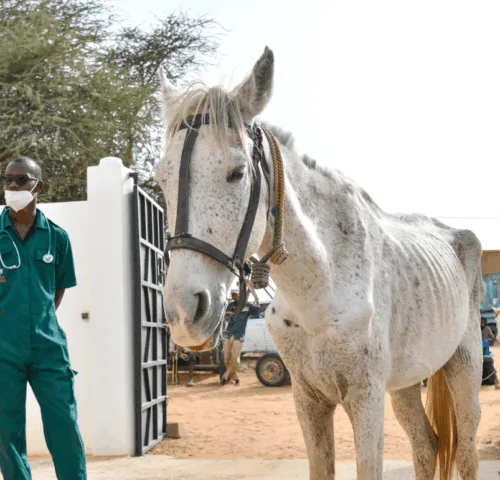Poverty remains a huge challenge faced by working animals worldwide, and this is only exacerbated by extreme weather. In Mauritania, the impact of intense heat and drought on food security and rural livelihoods makes it one of the most vulnerable countries. When blistering heat, drought and economic uncertainty collide, the outlook is grim.
Despite these conditions, thousands of working animals are still depended on to support their communities. Without adequate amounts of food or water to keep them healthy, their work is even harder. But with your support, we can ensure the lives of starving and malnourished working animals are not forgotten.
Will you please donate today to help working animals suffering from malnutrition?
Cissoko’s story
Cissoko ploughs fields alongside his owner Sidi, in the rural village of Dar es Salam, Mauritania, generating a small income to sustain his farm. Even in the 40°C heat, Cissoko toils in the fields for up to nine hours per day. It’s backbreaking work.
When Cissoko started to become lethargic and began to lose weight, Sidi became extremely concerned for his trusted 19-year-old horse. Cissoko’s condition deteriorated so much that he became unable to work – in fact, he was so weak, his legs buckled under the weight of his own body.
Fortunately, Sidi knew about SPANA and brought his horse to our Boghé centre. Following his arrival, the SPANA team carefully examined Cissoko – and found that he had become so dangerously malnourished that his ribs and hip bones were visible.
They first checked the state of his teeth to rule out any dental issues. The horse was dehydrated, and the team had been informed that his diet consisted of dry straw and grain, which is hard to digest. Not only was Cissoko severely underweight, but his poor diet had led to spasmodic colic, when the bowel becomes overactive and causes agonising intestinal cramps.
To treat Cissoko’s colic, the team administered anti-spasmodic medication to relieve the painful cramps. They also administered a deworming treatment and a multivitamin injection to improve his general condition. To ensure he made a full recovery, Cissoko was hospitalised at the centre, where his progress was closely monitored and he was given gradually increasing amounts of high-quality feed and water.
As Cissoko recovered, Sidi was advised on the best diet for his horse to improve his health, body condition and energy levels. Sidi was instructed to wet Cissoko’s food and introduce green grass into his diet.
After two weeks, Cissoko began to show steady signs of improvement, gaining weight and strength.
Without your support, Cissoko would not have received the essential treatment he needed. Instead, he would have endured gut-wrenching cramps, leaving him starved, exhausted and unable to eat. His deteriorating health would have only led to a life of misery and, in the worst-case scenario, an agonising death.
During this time of economic hardship, so many working animals are suffering from malnutrition, leaving them desperately weak as they fight for survival.
Could you make a donation today, so that animals like Cissoko can receive the lifesaving care they need? Thank you so much.


